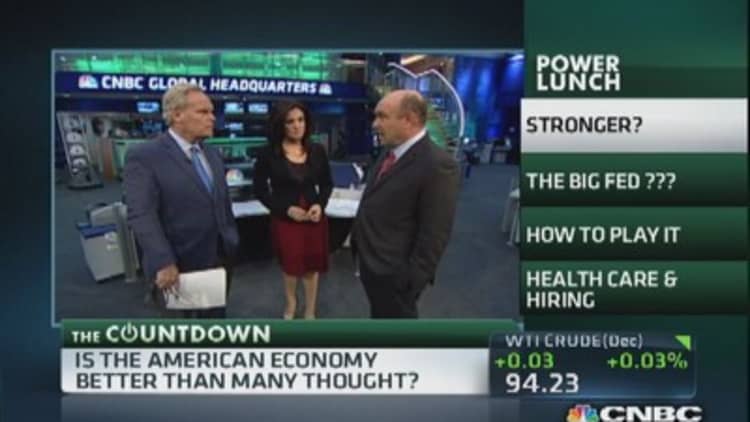
U.S. stocks climbed on Friday, with the S&P 500 bouncing back from its worst hit in 10 weeks to turn positive for the week, after a brighter-than-expected report on the labor market had investors considering whether the economy is strong enough to handle reduced monetary stimulus.
"The jobs report was better than expected in terms of the absolute number, but unfortunately, similar to recent reports in terms of quality. Some of the negative components include a decreasing participation rate and a general lower quality bias to the types of jobs that were being made," said Lawrence Creatura, portfolio manager at Federated Investors.
"Many consider jobs in the leisure and retail components of the economy as lower quality, and those types of jobs were a very significant portion of the gain," he added.
Gap jumped after the retailer reported profit that topped estimates; Priceline.com gained after its sales exceeded expectations.
Major U.S. Indexes
Up 0.9 percent from last Friday's finish, and rising for a fifth consecutive week, the Dow Jones Industrial Average climbed 167.80 points, or 1.1 percent, to end at 15,761.78, a record.
Blue-chip gains, which included 27 of its 30 components, were led by J.P. Morgan Chase.
McDonald's was among blue-chip decliners, with shares of the fast-food chain taking a hit after the company reported lower-than-expected comparable-restaurant sales for October.
The also gained for a fifth week, up 0.5 percent from last Friday, to post its longest weekly win streak since the middle of February, with financials the best performing of its sectors and utilities faring the most poorly. It climbed 23.46 points, or 1.3 percent, to end at 1,770.61, less than two points below its record close, set last Tuesday.
The Nasdaq climbed 61.9 points, or 1.6 percent, to 3,919.23, leaving it down nearly 0.1 percent from last Friday, its second straight weekly loss.
Twitter's stock fell on its second day of trade, with the short-messaging service staging a modest retreat after its large public-debut surge.

The dollar gained against the currencies of U.S. trading partners, and oil prices rose 60 cents, or 0.4 percent, to $94.60 a barrel, down a penny from the week-ago close. Gold futures fell $23.90, or 1.8 percent, to $1,284.60 an ounce, leaving the metal down 2.2 percent from last Friday's finish.
"This is an unexpectedly large beat for a report we expected to fall short," emailed Dan Greenhaus, chief global strategist at BTIG LLC, after the jobs report. But, given the likely impact of the government shutdown, "we have to wait until November's report to get a fuller picture of what's happening this fall," he added.
The data, however, set off speculation that the Federal Reserve could reduce stimulus before the end of the year, with the yield on the benchmark 10-year note used in figuring mortgage rates and other consumer loans jumping 15 basis points to 2.75 percent.
"This is an outside surprise that moves the discussion of taper from March to December, and I think that's what the 10-year is trying to price in right now," said Art Hogan, market strategist at Lazard Capital Markets.
Stock futures had turned lower immediately after the release of the data, which had a net 204,000 new jobs created last month, easily beating the 120,000 number anticipated, while the unemployment rate rose to 7.3 percent. Economists polled by Reuters expected the U.S. economy to have added 125,000 jobs in October compared with 148,000 in September.
"The good news is, at some point in time, we'll get back to that mindset we had in August, where taper is good news," added Hogan of thinking that signals from economic reports and the Fed that the economy is strong enough to withstand a cut in central-bank stimulus should be taken as a positive by the equities market.
The stock market offered muted reaction to a gauge of consumer sentiment coming in below expectations, with the Thomson Reuters/University of Michigan's preliminary November consumer sentiment index falling to 72.0 from 73.2 in the final October report. This month's count comes in below the 74.5 that had been forecast.
A separate report showed U.S. consumers slowed their spending in September, even as overall income expanded for a second month.
On Thursday, the Dow Jones Industrial Average fell 1 percent, the S&P 500 took its worst hit in ten weeks and the Nasdaq skidded 2 percent following the data.
—By CNBC's Kate Gibson
Coming Up This Week:
FRIDAY:Fed's Williams speaks
More From CNBC.com:


